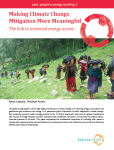Practical Action has released the second paper in its 'Poor People's Energy Briefing Series,' focusing on the link between universal energy access and climate change.
The briefing acknowledges that providing energy access to 1.2 billion people currently lacking it and decreasing energy consumption and greenhouse gas (GHG) emissions to address climate change are both policy imperatives.
The briefing recommends policy approaches that can advance both energy access and climate change objectives concurrently.
 9 December 2014: Practical Action has released the second paper in its ‘Poor People’s Energy Briefing Series,’ focusing on the link between universal energy access and climate change. The briefing acknowledges that providing energy access to 1.2 billion people currently lacking it and decreasing energy consumption and greenhouse gas (GHG) emissions to address climate change are both policy imperatives. The briefing recommends policy approaches that can advance both energy access and climate change objectives concurrently.
9 December 2014: Practical Action has released the second paper in its ‘Poor People’s Energy Briefing Series,’ focusing on the link between universal energy access and climate change. The briefing acknowledges that providing energy access to 1.2 billion people currently lacking it and decreasing energy consumption and greenhouse gas (GHG) emissions to address climate change are both policy imperatives. The briefing recommends policy approaches that can advance both energy access and climate change objectives concurrently.
According to the briefing, titled ‘Making Climate Change Mitigation More Meaningful: The Link to Universal Energy Access,’ the predicted increase in GHG emissions as a result of providing universal energy access is inconsequential relative to the energy system’s contribution to climate change as a whole. The paper thus posits that “energy access is not a climate change issue” in the sense that it will not contribute significantly to the problem.
On the other hand, supplying energy access “increases incomes, improves heath, healthcare, education, and security, and reduces labor-intensive practices,” according to the author. The paper argues that universalizing energy access must be integrated into climate change planning to ensure that climate policies are pro-poor, to embrace clean cooking initiatives not only for health but for the climate, and to harness climate-smart energy for poor households.
In suggesting a course of action for policymakers, the briefing focuses first on the need to ask the right questions and train the right people. Proposing that old ideas about the high-price of renewables and assumptions about community needs should be re-thought, the author recommends focusing on capacity- and skills-building rather than “traditional donor-driven ‘technical assistance’.” The paper emphasizes that a community-based mitigation approach could help ensure the poor are not once again left behind in global development efforts.
Lastly, the author reviews some of the primary international actors that have started to innovate in this space, looking for ways to link climate change and energy access policy. An overview of initiatives under the UNFCCC, Sustainable Energy For All (SE4ALL) initiative, regional and economic trade blocs, multilateral development banks and other financial institutions, and the national governments of energy poor countries reveals that many existing institutions are well-placed to spark rapid progress toward universal energy access. [Practical Action Publication Webpage] [Publication: Making Climate Change Mitigation More Meaningful: The Link to Universal Energy Access] [IISD RS Story on First Briefing]